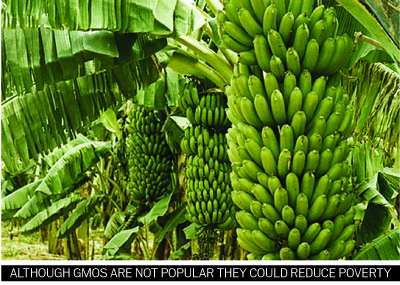Business
Anti-business attitudes suffocate Uganda’s GM revolution

After close to two years of a national campaign to seek the views of Ugandans on a proposed law to regulate Genetically Modified Organisms, triggered a deep sense of frustration and regrets from scientists and a number of agricultural entrepreneurs who view the decision as a missed opportunity for the country to leap from its current odds of low productivity, high incidence of crop and animal diseases as well as nutrient shortages that have conspired to keep millions of Ugandan farmers poor and sick.
Dr Andrew Kiggundu, the head of the Biotechnology Centre at the National Agricultural Research Laboratories (NARL) in Kawanda, and one of the bill’s foremost backers told journalists they have been informed that government directed the Clark to Parliament to remove the Biotechnology and Biosafety Bill popularly known as the GM bill, from the list of bills for consideration in the current session of Parliament.
Although this position has been countered by the Speaker’s office, comments by most MPs, including those from the S&T Committee itself, indicate bill, at least in its current form, is dead.
According to Kiggundu, the new chairman of the Parliamentary Committee on Science and Technology, Anthony Ssemmuli told him recently that; “your thing is not popular with the people”.
Kiggundu’s calmness indicated he is still optimistic about Ugandans realising the need for the technology soon or later, as he cited the need to feed the rapidly growing population amid climate change and frequent disease outbreaks.
“Uganda is gifted by nature and this also means that the environment is conducive for disease pathogens to emerge and quickly spread. This calls for tools that can help us to counter the threats without having to depend on foreign assistance,” said Kiggundu.
Kiggundu argued the apparent failure by government to mobilise its majority in Parliament to back the bill, represents a lack of stewardship and political will to champion the transformation and modernisation of the agricultural sector and thereby fight poverty in the country.
In fact, moments of emotion and frustration occasionally burst through his sense of sobriety as he noted that the country’s leaders have once again rued the opportunity to exploit immense potential in farming using GM technology that would have sparked an economic boom and propel it fast forward as the case was with Asia and Latin America thanks to the green revolution.
“The government never seeks public consensus on matters such as taxes which are unpopular with many people but it goes ahead and imposes them anyway because they are important for its functioning,” Kiggundu remarked.
“If policy makers decide to just keep quiet about the law, I think they are doing a disservice to the country because a lot of investment has already gone into the development of varieties that can help in controlling some of the diseases attacking our crops,” he added.
While popular consensus is a desired democratic principle, governments sometimes avoid it especially when the matter involves a strategic national issue and is handled by experts.
The decision to develop Uganda’s oil and gas resources, despite its potential adverse effects on the fragile environment in the Albertine region, has been cited as one of those aspects where the NRM government has taken a ‘strategic’ decision and not sought popular support.
On the contrary, the failure to pursue a similar determined approach with agriculture, some have argued, could undermine the country’s economic potential, especially considering its comparative advantages with her neighbours, but also in view of the threats facing farming in Uganda such as diseases, climate change and low productivity.
Uganda may still be self reliant in terms of food, but with rapid population growth coupled with the failure to adopt scientific tools to protect the food system, it is feared that the country may easily become dependent on imported food like Nigeria, Ghana and several west Africa countries.
Nigeria is one of the African countries that are already suffering the effects of government’s neglect of agriculture following its discovery of oil, as seen from its low public investment in agricultural research, high input costs, corruption in its fertiliser distribution chain among other crippling tendencies.
The result is that the country has become dependent on food imports mostly from Asian countries – which embraced the green revolution that saw the region dramatically boost its food production in a few years.
Nigeria for example imports rice worth $2b per year, yet according to the country’s agriculture minister Akinwumi Adesina, the country can very well grow upland and low land rice.
But due to the government’s lack of stewardship and low investment in the sector, the country spends more than $11b on rice, wheat, sugar and fish, a situation Akinwumi described as unsustainable and a source of dependency.
The green revolution, which is credited for the eradication of hunger and an eventual economic boom in Asia and Latin America, was characterised by deliberate and large scale adoption of improved seeds – mostly hybrids coupled with intensive utilisation of fertilisers and irrigation.
Fear is growing that Uganda and generally much of Sub-Saharan Africa, will again miss out on yet another major agricultural transformation – the genetic revolution – thanks to the adoption of laws and policies that not only hamper scientific research but also prevent multi-national agricultural companies from establishing in Africa.
If the world’s greatest economies – China, The United States, France, The Netherlands and several others had to modernise their agriculture to advance, the current policy hesitation could then be interpreted as a roadblock to development.
Comments



















